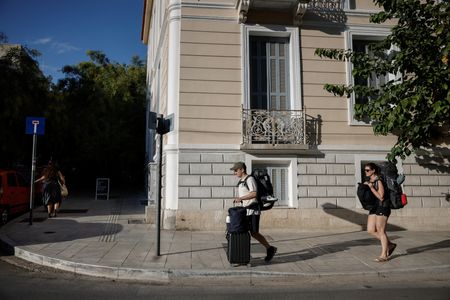ATHENS (Reuters) – Greece said on Friday it would give a three-year tax break to homeowners who convert their short-term rentals to long ones, becoming the latest European country to clamp down on holiday lets to tackle a housing shortage.
Europe’s short-term rental boom has already prompted tourism hotspots such as Spain’s Canary Islands, Lisbon, Berlin and Florence to announce restrictions on such lets, which many local people blame for pricing permanent residents out of the market.
As part of a plan to tackle housing shortages, Prime Minister Kyriakos Mitsotakis said last week that Greece also planned to increase a tax on short-term rentals and ban new licences in central Athens.
Residents of the capital responded positively to the plans.
“It’s a huge issue because it’s changing the urban landscape. Where there are traditional buildings, now there’s a modern one next to them, designed to be an Airbnb,” says 58-years old Athens resident Penny Platanitou.
Valentina Reino, head of public policy for Airbnb in Southern Europe, said on Friday that her company was ready to work with the Greek government on “targeted and proportionate solutions”.
Low wages, high inflation, property shortages and the growth in short-term holiday rentals have fuelled a housing crisis in Greece still recuperating from a nearly decade-long debt crisis. Low-income earners, young couples and students have been hit particularly hard.
Greece has spent 2.2 billion euros so far to subsidise low-interest loans to help young people onto the property ladder and will earmark an additional 2 billion euros to extend the plan to couples up to 50 years old.
“Greece, indeed, has joined that team of countries in recent years where the housing shortage is pushing families unbearably,” Sofia Zacharaki, Greece’s minister for social cohesion and family affairs, told a press conference to present the plan.
(Reporting by Lefteris Papadimas and Angeliki Koutantou; Editing by Christina Fincher)














